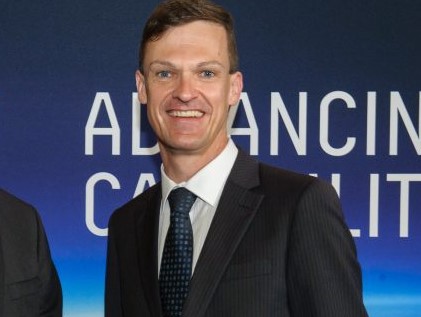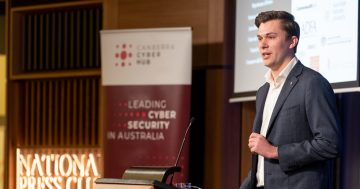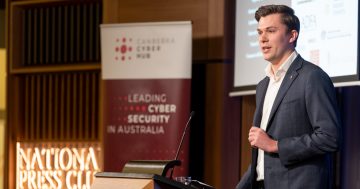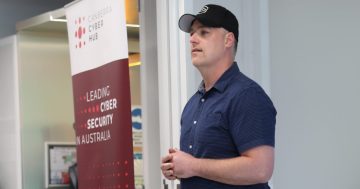
An ACT program aims to define the skills needed in cyber security and identify talent now. Photo: ACT Government.
Cyber security may have been a big winner in the Federal Budget but finding the people to make the Federal Government’s ambitious plans a reality will be challenging.
The ACT Government and Digital Skills Organisation (DSO) aims to help address the cyber skills shortage and meet the needs of the ACT’s growing tech sector with a new 12-month pilot program through the Canberra Cyber Hub.
It will focus on developing a new National Skills Framework for cyber security in cooperation with industry.
Canberra Cyber Hub chair Michael Frater said that while encouraging young people to take STEM subjects as a pathway to the TAFE and university sectors was crucial; it was a long-term strategy.
“We don’t have 10 years,” Mr Frater said.
He said a broader, more immediate approach was to find talent in other sectors who could transfer their skills and experience to the cyber security environment where they could then receive specific training and education.
There were roles required in areas such as assurance and governance that would suit people whose experience was in project management, accountancy or law.
“The model is we bring people from a wide range of backgrounds into an internship program, give them training and education upfront, then after a couple of years they receive on the job training and continuing development through their employer,” Mr Frater said.
“Internships could be anywhere cyber security is needed – consultancies providing services to government or in government itself.”
Mr Frater said the pilot program would identify the necessary skills and attempt to standardise them so employers knew what to expect from staff.
“We’re seeing the Commonwealth Government look at this more and more because there are difficulties in applying the competency-based system used in the TAFE sector, particularly to the digital economy,” he said.

Canberra Cyber Hub chair Michael Frater. Photo: UNSW Canberra.
Employers also struggled to understand what capability they were getting in a graduate.
Digital Skills Organisation CEO Patrick Kidd said defining a standard to describe the skills required for an entry-level cyber security professional would simplify the skilling system.
“This is a great opportunity to co-design cyber skills training with employers while opening up more accessible and diverse pathways in this profession,” he said.
“The consistent application of an employers’ standard will provide clear guidance to training providers on priorities and is something which learners can be assessed
against. This will give confidence to employers about the people they employ.”
Mr Frater believed plenty of people looking for a mid-career change were not aware that they already had a foundation for being successful in cyber security.
“We’re trying to help them see that,” he said.
The program would open up opportunities for firms to hire people, Mr Frater said.
He added that the way ahead should not mean firms competing against each other and government for staff but working together.
“The way to solve this problem is to pool not to poach,” he said
It was also essential to develop home-grown skills given the national security constraints that some migrants may face.
And those skills needed to be flexible and adaptable to meet the evolving nature of cyber security threats.
He said Canberra’s tech scene had a lot to gain from the cyber security boom, especially as the centre for government in Australia. Its growth in recent years was a testament to the city’s advantages for doing business.
“Over the last seven or eight years, there has been a real explosion in the technology and innovation sector more broadly and it’s a great place to start a tech business,” Mr Frater said.
“We have companies selling to the world.”
Canberra is close to government and its accessibility compared with Sydney and Melbourne makes for easy networking.
The Canberra Cyber Hub is calling on the local industry to help design the skills standard by participating in a survey and upcoming workshops to help identify the gaps and grow a pool of diverse cyber professionals as quickly as possible.
It has also launched a new website to encourage individuals, businesses and education providers to upskill and promote cyber security careers.
To learn more visit the Hub website.





















